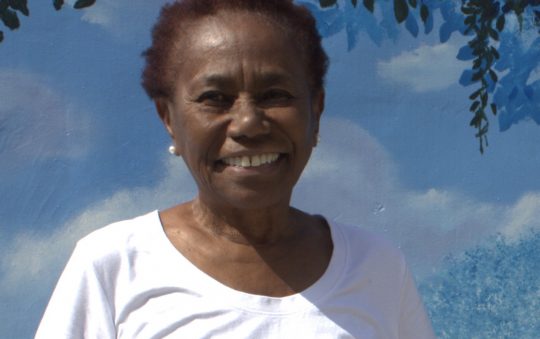
I write today in advocacy for Senate Bill 1348, Postsecondary Education: Designation of California Black-Serving Institutions. As a Crenshaw District native, my life has been deeply shaped by my community and education. My journey from being a justice-impacted first-generation graduate to earning a Doctor of Education is a testament to the power of people and institutions that supported me. Before I begin, I want to acknowledge my higher ed OG the “Opportunity Giver,” Dr. Keith Curry, President/Chief Executive Officer, for tapping me to share my perspective. In doing so, I will continue what he started in his May 2024 opinion piece by drawing inspiration from the late Crenshaw icon and my Hamilton High schoolmate Ermias “Nipsey Hussle” Asghedom. This Opinion article will leverage his “All Money In” philosophy, which emphasizes reinvesting all resources into the Black community to frame Senate Bill 1348 as an imperative measure for California higher education.
Never Let A Hard Time Humble Us
We can skip the deficit narrative around Black educational outcomes. By now, we know that California and national institutions continue to fail Black students. My experiences as a Historically Black Colleges and Universities (HBCU) alum and leader echo the broader challenge Black students face in higher education. However, success stories like mine show the potential for transformation through progressive, scalable measures like Senate Bill 1348.
The necessity of a Black Serving Institution Designation for California institutions is rooted in the longstanding underrepresentation of Black students in higher education. Despite various initiatives to address these disparities, the problem persists. We can trace the degrees of inequality to the 1862 Morrill Act, which excluded Black Americans from land-grant universities. The 1890 revision addressed this by promoting HBCUs, but underfunding has always been a persistent challenge for these institutions and remains so for Black Serving Institutions and programs today
He Knows He A Genius, but He Can’t Claim It, They Left Him No Platforms to Explain It
As an alum of Hampton University, the University of Southern California, and San Diego State University, I have experienced firsthand the transformative power of equity-forward institutions. Hampton University played a crucial role in my academic journey. Growing up—outside of football—my grades often reflected a sense of underachievement. I almost failed out of college in my first semester with a 1.2 grade point average.
Like many of our students, I didn’t possess the social or cultural capital to decode the matrix of our education system, but I remained aware of my potential. Hampton also provided a platform for me to claim my genius. I was fortunate to attend an HBCU that engineered every aspect of learning with the highest expectations for Black success.
I still remember the words of my freshman convocation speaker: “Look to your left, look to your right. One of you will not be here at the end of the year.” Hell, I almost didn’t make it out of the first semester. Yet the standard of excellence ingrained at Hampton became the foundation of my work as a Black student success activist. The values I learned from Crenshaw and the figurative HBCU polish I received at the illustrious HU shape how I serve students today. Over the past six years, the Umoja program I lead at Los Angeles Valley College has exceeded institutional metrics for Black student success, retention, and persistence. We have also nearly closed the equity gap
How Long Should I Stay Dedicated? How Long ‘til Opportunity Meets Preparation?
Despite a multitude of well-intentioned initiatives in California Community Colleges, outcomes for Black students remain below expectations. California’s Black unemployment and poverty rates are at 7.4% and 22.3%, which highlights a stifled demographic, according to the California Budget and Policy Center.
Within this pendulum, there are some bright spots in California’s higher education worth highlighting. The Umoja Community Education Foundation—a global initiative at 77 of the 116 community colleges designed to increase the success of Black students and their transfer to four-year colleges—has proven successful. According to the Umoja program’s 2023 year-in-review report, participating students are three times more likely to earn a degree, two times more likely to earn an Associate Degree for Transfer, and transfer within three years. This success shows the power of targeted support services for Black students that transform institutions from the inside out.
Similarly, Dr. Luke Wood, whose work at San Diego State University (SDSU) and now Sacramento State University, where he is the president, is transforming the institution for Black and African American students. Wood’s initiatives, including faculty cluster hires and equity programs, laid the groundwork for California’s first Black Honors College and the Black Serving Institutions.
Yet these efforts, while groundbreaking, cannot reach every Black student. Unfortunately, many institutions continue to prioritize equity efforts so broadly that Black students often fall through the cracks. The priority paradox suggests that if everything is a priority, nothing is. Despite the surge of various Black higher educational programs, outcomes for Black students remain uneven, and resources for such programs are limited and frankly shoddy.
The systemic barriers also extend beyond students to include Black practitioners who serve them. The “Black tax” of anti-blackness, racial battle fatigue, and underrepresentation have led to the retreat of Black administrators and driven many Black professionals out of higher education altogether. This “great resignation” has exacerbated the already low numbers of Black faculty and administrators in California’s community colleges and could explain the 650,000 loss in Black talent due to rapid declines in enrolled students since 2010 (National Center of Educational Statistics). According to 2023 California Community College analytics, Black faculty and administrators comprise only 6.4% of the workforce, while Black students represent just 5% of the CCC student body. These numbers pale compared to the Latinx representation, where 25% of faculty and administrators serve a 48% Latinx student body (California Community Colleges Chancellor’s Office Data Mart, 2023).
The Marathon Continues
A wise Dr. Curry once said, “Show me your budget, and I’ll show you your value statement!” Black Serving Institutions and programs remain invaluable to California, upholding its commitment in meeting the specific needs of Black students. Therefore, “All Money In” means budgeting significant resources to empower Black and African American student-facing programs. The state, districts, and institutions must invest heavily in Senate Bill 1348.
This investment should include but is not limited to:
- Increased funding for racialized support services
- Scaling affinity-based mental health and basic need resources
- Prioritization of peer-based and faculty-based Black mentorship programs
- Promoting evidence-based accountability for funding levels
- Strengthening community and transfer pipelines
Just as Neighborhood Nip invested in building infrastructure for the Crenshaw community, California must intentionally and deliberately redirect funds toward Black Serving Institutions like Compton College, Los Angeles Southwest College, West Los Angeles College, and CSU Dominguez Hills. Even colleges that don’t meet the Senate Bill 1348 enrollment criteria but achieve high success—like Los Angeles Valley College—should also receive support for respective programs like the Umoja Community Foundation, A²MEND, NANDI, Pipeline to Possibilities, and the HBCU Transfer Agreement.
Furthermore, the pulse of Crenshaw and HBCUs offers gleanable lessons for transformative systemic investments that guarantee success for Black students across the state. We can ensure that Black students, programs, and institutions thrive by prioritizing and scaling proven Black Serving Institutional practices. The signing of Senate Bill 1348 was the first necessary step to making this vision a reality.
Higher education institutions are only good when we are all good. Thus, Black success and this designation must become everybody’s business. Because when Black students succeed, we can all succeed and finally take our Victory Lap!
Elliott Coney, Ed.D., is the Counselor and Coordinator for the Umoja Black Scholars Program at Los Angeles Valley College.



